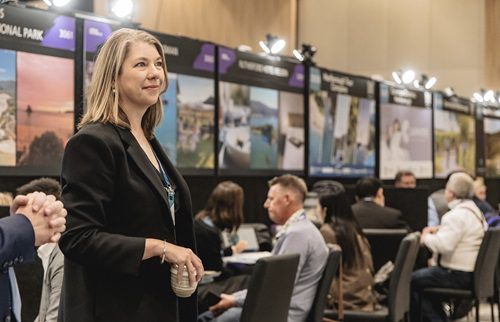 New Zealand’s tourism industry is building on its grand plan for the next 30 years, as research shows that 81% of those actively considering NZ for a holiday have strong sustainability beliefs versus 52% of the general population.
New Zealand’s tourism industry is building on its grand plan for the next 30 years, as research shows that 81% of those actively considering NZ for a holiday have strong sustainability beliefs versus 52% of the general population.
In Wellington on Friday at TRENZ, New Zealand’s largest and most influential travel show, Tourism Industry Aotearoa (TIA) Chief Executive Rebecca Ingram discussed why building the capability of tourism operators was so important.
“‘Bouncing back to 2019’ is not part of our vernacular,” Ingram said. “Rather, we are focused on purposefully creating a resilient and sustainable industry that delivers for the country, our people, our environment and visitors.
“I often say the tourism of the future will not look like the past. This is an exciting future where tourism takes on the challenges ahead while always providing world class visitor experiences and wide benefits for New Zealanders.”
Ingram explained that a central premise of the new Tourism 2050 Blueprint is “balanced growth”.
“This involves ensuring that different aspects of the tourism industry develop in a way complementary to each other and benefits the destination at place and as a whole. The Blueprint canvases the global and local factors that will pull and push the way tourism develops here and articulates how we will proactively respond to mature our tourism offering and impact.:
The industry would start this year to put this plan into action, Ingram said.
“There are 10 actions between now and 2030 that we believe we need substantive progress on. They fall into three broad areas:
- Resetting our System Design and Management means looking at the design of the tourism system, how it’s funded, the insights we need for decision-making, and embracing Te Whakarae Māori. Te Whakarae Mori is about fostering relationships and elevating the role of Māori voices within the tourism industry.
- Action on Carbon Emissions and Biodiversity is about addressing carbon, predator-free, and biodiversity issues and advocating for tourism and the conservation estate to work in partnership.
- The third area is Equipping Tourism Businesses—this is about increasing the capability of tourism businesses so they are prosperous, run sustainably, grow, support their tourism workforce, and embed the Tiaki Promise. I will largely focus on this area today.
“The New Zealand tourism landscape has changed significantly over the last few years. We are an industry with a clear view of where we are going, and we recognise our deep connection to and reliance on the environment.
“We believe sustainability is the future of tourism – and New Zealand can stand apart if we act. We have seen for some time now that we must move quickly toward sustainability. It’s the right thing to do and about ensuring we remain a competitive destination.
“Recent research by Tourism NZ and MBIE shows that 81% of those actively considering NZ for a holiday have strong sustainability beliefs compared to 52% of the general population. And it makes financial sense. 90% of these active considerers say they will pay a premium for sustainable tours and activities.
“Our market is attuned to sustainability, they will expect it here.”
Ingram said tourism was not playing catch-up in this regard, reminding the audience that TIA developed the Tourism Sustainability Commitment in 2017 and that over 1900 tourism businesses have signed up to it.
“In our recent annual declaration, 97% of tourism businesses cite sustainability as important to their business. But they need support to build their capability. We have been diligently working away, making progress. But this research tells us that consumer sentiment is shifting fast, and we need to scale up.
“We believe that offering support to tourism businesses is the essential step to making a wide range of gains. Taking the first steps in sustainability can have a multitude of downstream benefits. Specific and well-designed support is critical for making this happen broadly across the industry.
Written by Peter Needham at TRENZ in Wellington, New Zealand



















